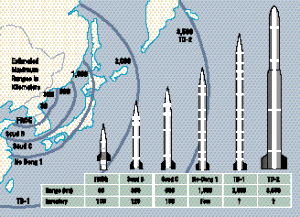China Expresses Concerns Over Potential North Korean Missile Launch At Its 70th Anniversary of Worker’s Party Foundation
 North Korea has begun preparations as the ruling Workers’ Party approaches its 70th anniversary on October 10 by displaying recent advancements in missile technology. Chinese President Xi Jinping expressed concerns over North Korea’s missile programs during his visit to the United States this past week. Despite a joint statement issued by North and South Korea last August, a missile launch commemorating the anniversary would strain the brief moment of reconciliation enjoyed by the peninsula and would further aggravate the Chinese President.
North and South Korea reached a joint statement lifting North Korea’s “semi-state of war” in exchange for South Korea halting its loudspeaker propagandas aimed at revealing the truth behind North Korean leader Kim Jong Un and his family. While tensions have diffused over the past few weeks, a North Korean missile launch would likely be regarded by South Korea as an “abnormal case” and South Korea would resume its loudspeaker propagandas.
North Korea has begun preparations as the ruling Workers’ Party approaches its 70th anniversary on October 10 by displaying recent advancements in missile technology. Chinese President Xi Jinping expressed concerns over North Korea’s missile programs during his visit to the United States this past week. Despite a joint statement issued by North and South Korea last August, a missile launch commemorating the anniversary would strain the brief moment of reconciliation enjoyed by the peninsula and would further aggravate the Chinese President.
North and South Korea reached a joint statement lifting North Korea’s “semi-state of war” in exchange for South Korea halting its loudspeaker propagandas aimed at revealing the truth behind North Korean leader Kim Jong Un and his family. While tensions have diffused over the past few weeks, a North Korean missile launch would likely be regarded by South Korea as an “abnormal case” and South Korea would resume its loudspeaker propagandas.
North Korea has traditionally displayed military parades equipped with the latest weapons and missiles on special occasions, such as the founding of the Workers’ Party and Kim Il Sung’s birthday. This year appears to be no different as North Korea recently revealed its satellite program to the world by inviting CNN to report on its satellite control center.
A senior official in the North Korean National Aerospace Development Administration (NADA), stated in his interview with CNN, “We hope satellites will improve the country’s economy and living standards of our citizens. The satellite we intend to launch is for observational purpose only.”
North Korea is currently forbidden to launch ballistic missiles by the United Nations Security Council Resolution. While clearly implying it has intentions to launch a missile, this remark can be interpreted as an attempt to assure the international community that its intentions are for peaceful purposes. Another member of the satellite project noted, “Why would we attempt to drop a nuclear bomb in different countries, including the United States?” North Korea may hope to mitigate international censure by providing an early warning of its project. North Korea previously employed the strategy of inviting foreign media prior to its unsuccessful missile launch in April 2012.
China, the closest ally and benefactor to North Korea, has continually pressured the country to abandon its missile programs. Part of Xi Jinping’s itinerary to the United Nations General Assembly included a stop in Washington D.C. to meet with President Obama and discuss various issues including the situation in the Korean peninsula.
In their meeting, Xi affirmed China’s firm stance against North Korea’s missile programs. “We reaffirm our commitment to realize the complete and verifiable denuclearization of the Korean peninsula in a peaceful way and we oppose any action that might cause tension in the Korean peninsula or violate UN Security Council resolutions,” Xi said.
The Chinese President’s remark was his first public statement regarding the Security Council Resolutions. The statement was a victory for South Korea as Xi adopted a harsher stance against North Korea compared to the milder warning he issued in the China-South Korea summit earlier this month. Experts see Xi’s posture as a direct warning against North Korea’s missile and nuclear program, which may further strain the deteriorating relationship between the two nations.
